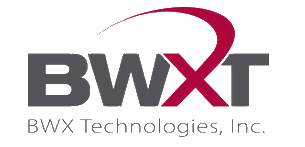The short-lived radioisotope technetium-99m (Tc-99) is used for more than thirty million medical procedures each year for treatment and diagnosis around the world. Tc-99m is the most widely used radioisotope for medical imaging. Tc-99m is generated from molybdenum-99 (MO-99) which also has a short half-life. They have to be used quickly after they are produced. This requires a stable supply of them for the world medical market.
Mo-99 production has been mainly carried out in a small number of research reactors. Many of these reactors were constructed and put into operation in the 1960s. There have often been disruptions in Mo-99 production which has resulted in shortages of this important radioisotope.
BWX Technologies (BWXT) is an American company in the nuclear technology sector. It builds steam generators and other nuclear components and manages “high-consequence nuclear and national security operations.” The company is working on a small modular reactor called the B&W mPower. It also recently announced the development of a special device to generate Mo-99 and Tc-99.
The President and CEO of BWXT says that the current Mo-99 infrastructure is inefficient, scattered around the globe, seriously antiquated, and has "burdensome" logistic. He said that his company has a breakthrough technology that solves the problems of an expensive, unstable supply system that produces complex radioactive waste that could lead to the proliferation of nuclear weapons.
The BWXT Mo-99 production device is based on a neutron capture process. The device will produce Mo-99 from natural molybdenum instead of using enriched uranium targets which is the primary current production method. Tc-99m can be extracted as needed from the device which is still under development.
BWXT will initially focus on the North American market where there is currently no Mo-99 production. Their plans call for the production of sufficient Mo-99 to satisfy all demands in North America. The President and CEO said “We are presently working to finalize agreements that will provide us with a long-term and stable irradiation supply of Mo-99 and other medical radioisotopes from multiple source.”
The Mo-99 Tc-99 generator is being designed to be able to be inserted into the existing configurations and processes of radiopharmacies without the need for any special hardware or adaptions. The U.S. Food and Drug Administration (FDA) will have to approve the device before it can be sold.
BWXT has just signed an agreement to purchase Sotera Health’s Nordian medical isotope business in order to speed up their entry into the medical radioisotope business. The acquisition will reduce risks for BWXT and provide an already licensed infrastructure, one hundred and fifty trained and experienced personnel, and two production centers. If approval can be obtained from U.S. and Canadian regulators, BWXT hopes to finalize the deal by the end of 2018.
The President and CEO of BWXT says that they will use the acquisition of Nordian to help them obtain the approval of the FDA and commercialize their device. Their plans call for adapting the two Nordian facilities to the production of the technetium generators.
